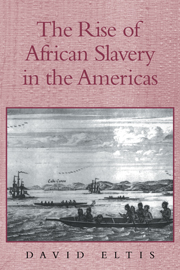Book contents
- Frontmatter
- Contents
- List of Tables
- List of Maps
- Preface
- Abbreviations
- Chapter 1 Slavery and Freedom in the Early Modern World
- Chapter 2 The English, the Dutch, and Transoceanic Migration
- Chapter 3 Europeans and African Slavery in the Americas
- Chapter 4 Gender and Slavery in the Early Modern Atlantic World
- Chapter 5 Productivity in the Slave Trade
- Chapter 6 Africa and Europe in the Early Modern Era
- Chapter 7 The African Impact on the Transatlantic Slave Trade
- Chapter 8 The English Plantation Americas in Comparative Perspective
- Chapter 9 Ethnicity in the Early Modern Atlantic World
- Chapter 10 Europe and the Atlantic Slave Systems
- Epilogue on Abolition
- Appendices
- Maps
- Sources and Bibliography
- Index
Chapter 5 - Productivity in the Slave Trade
Published online by Cambridge University Press: 05 August 2012
- Frontmatter
- Contents
- List of Tables
- List of Maps
- Preface
- Abbreviations
- Chapter 1 Slavery and Freedom in the Early Modern World
- Chapter 2 The English, the Dutch, and Transoceanic Migration
- Chapter 3 Europeans and African Slavery in the Americas
- Chapter 4 Gender and Slavery in the Early Modern Atlantic World
- Chapter 5 Productivity in the Slave Trade
- Chapter 6 Africa and Europe in the Early Modern Era
- Chapter 7 The African Impact on the Transatlantic Slave Trade
- Chapter 8 The English Plantation Americas in Comparative Perspective
- Chapter 9 Ethnicity in the Early Modern Atlantic World
- Chapter 10 Europe and the Atlantic Slave Systems
- Epilogue on Abolition
- Appendices
- Maps
- Sources and Bibliography
- Index
Summary
The previous two chapters have pointed to the shadowy outlines of cultural norms that neither class nor self-interest can easily explain. Merchants, both European and African, like most others in their community, spent little time questioning these attitudes. Indeed, we could not describe attitudes as cultural norms if they had. Rather they got on with the business of making money, and it is to the relatively precise business of exploring the consequences of their behaviour that the argument now turns. The European ability to create transoceanic trading networks and establish colonies of occupation and settlement hinged on first, the rather prosaic issue of shipping technology and second – given the cultural constraints on enslaving Europeans – the availability of slaves from some non-European source. For most of the 350-year span of the transatlantic slave trade, increasing demand for labor from the Americas as the two continents were repeopled and the increasing value of that labor as technology made people more productive meant steadily rising prices for slaves. In the 1650–1713 period the explosive growth of the English plantation system and the discovery of gold in Minas Gerais in the mid-1690s were specific manifestations of demand pressure. Any price may be broken down into either demand or supply components, but the key to understanding the performance of the English, Danish, Dutch, French, and Portuguese slave traders relative to each other lies largely on the supply side, and this forms the main concern of the present chapter.
- Type
- Chapter
- Information
- The Rise of African Slavery in the Americas , pp. 114 - 136Publisher: Cambridge University PressPrint publication year: 1999



